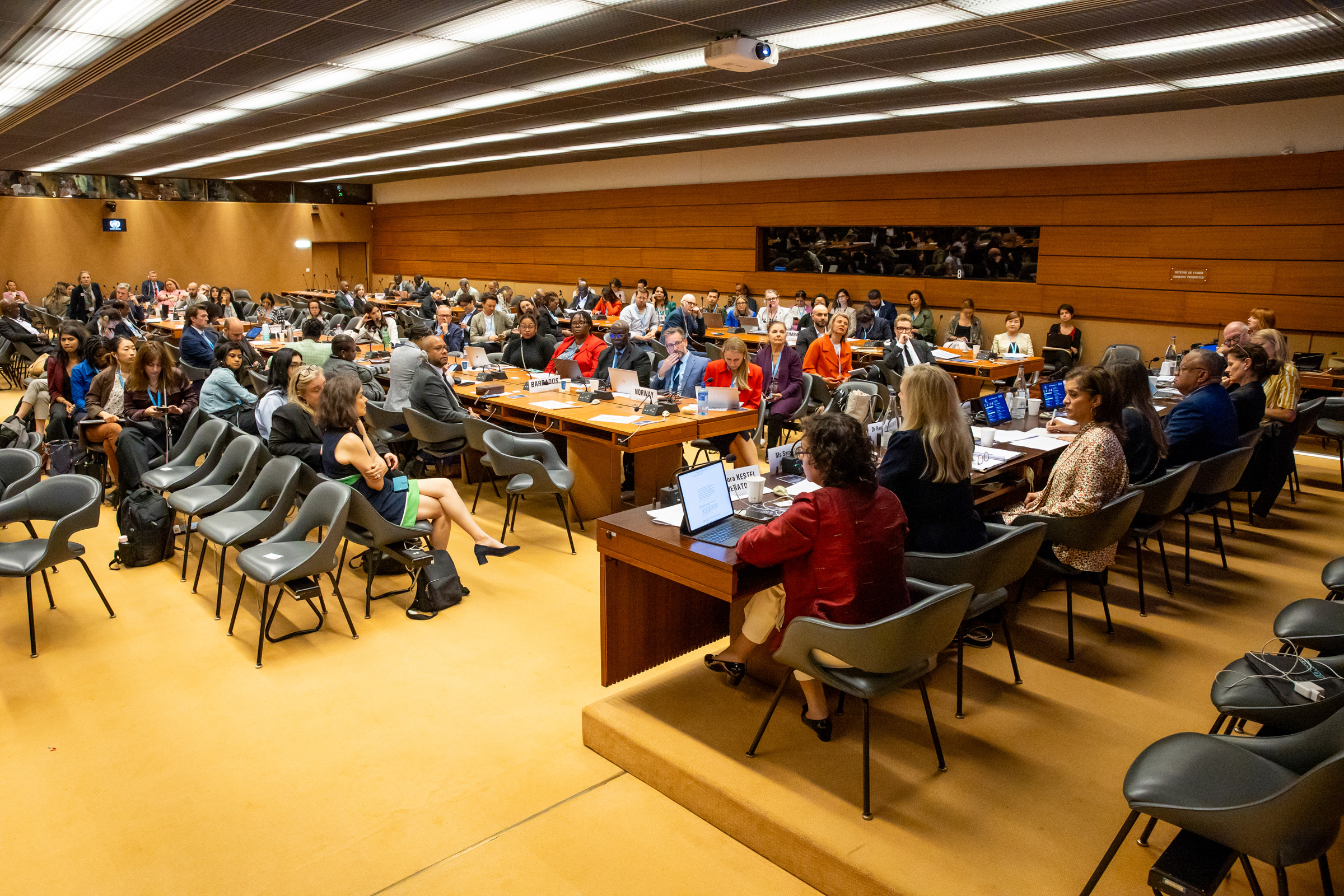World Health Organization
From Mandate to Implementation: Operationalizing National Multisectoral Governance for NCDs in Kuwait
Multisectoral Action
17 Dec 2025
World Health Organization | 28 May 2025
High-level Official Side Event Convened by Barbados, Norway, Spain, the NCD Alliance and United for Global Mental Health
Member States, civil society and public health experts convened on the sidelines of the 78th World Health Assembly to issue a call for action and to chart the path forward on noncommunicable diseases (NCDs) and mental health. NCDs, including heart disease, cancer, diabetes, and chronic respiratory diseases, kill 43 million people annually and are the leading cause of death globally. Mental health conditions affect nearly one billion people worldwide.
The gathering was organised by Member States and civil society at a critical time, just months before the 25 September 2025 Fourth UN High-Level Meeting on preventing and controlling noncommunicable diseases (NCDs) and promoting mental health and wellbeing and coming little more than week after the release of the zero draft “Political declaration of the fourth high-level meeting of the General Assembly on the prevention and control of noncommunicable diseases and the promotion of mental health and well-being”.
The event, titled "Equity and integration: transforming lives and livelihoods through leadership and action on NCDs and the promotion of mental health and well-being," took place on 21 May at the Palais des Nation featured high-level speakers from Barbados, Norway and Spain alongside the Regional Director of the WHO Office for the Eastern Mediterranean Region and the Chief Executive Officers of the NCD Alliance and United for Global Mental Health.
Professor Jérôme Salomon, WHO's Assistant Director-General for Universal Health Coverage, Communicable and Noncommunicable Diseases, opened the event by emphasizing the urgency of the moment: “We approach the fourth United Nations High-Level Meeting at a pivotal moment in time: the impact of the pandemic, ongoing conflicts, the climate crisis, financial instability, and spiralling debt burden are pushing the noncommunicable diseases and mental health agendas off course.”
His Excellency, Dr Jerome Walcott, Minister of Health and Wellness of Barbados, delivered a keynote address highlighting how Small Island Developing States (SIDS) have pioneered world leading approaches for trackling environmental determinants and investing in resilient health systems. He reflected on the importance of the 2023 Bridgetown Declaration, which has become a catalyst for progress and, in particular, in transforming responses for addressing the commercial and environmental determinants of health.
Reflecting on Minister Walcott’s remarks, Dr Guy Fones, Director of the WHO NCD Department emphasised the importance of the Bridgetown Declaration and the leadership of SIDS to the ongoing development and negotiation of the forthcoming Political Declaration on the UN High-Level Meeting. In connection with these remarks, Dr Fones announced the launch of a new WHO tool for supporting SIDS lead in the response on NCD and mental health: a technical paper on the Economic and commercial determinants of health in small island developing states: noncommunicable diseases, mental health conditions, injuries and violence.
Belén González Callado, Commissioner for Mental Health in Spain, shared how her country has transformed mental health care through mentalk health integration into primary health care through ambitious community-based approaches that move away from institutionalized care. Dr Cathrine Marie Lofthus, Secretary-General of Norway's Ministry of Health and Care Services, highlighted Norway's success in strengthening social and health indicator surveillance.
Dr Hanan Balkhy, WHO Regional Director for the Eastern Mediterranean, addressed the critical challenge of maintaining NCD and mental health services during emergencies and humanitarian crises. She emphasized the importance of a broad response that addresses food insecurity and broader social determinants of health during crises while emphasising the urgency of action by drawing on her experiences and insights from across conflict-affected parts of the Eastern Mediterranean Region.
Katie Dain, CEO of the NCD Alliance, and Sarah Kline, CEO of United for Global Mental Health, stressed the importance of centering people with lived experience in policy development and implementation as well as accountability systems at all levels. They called for urgent action to break the current inertia and drive meaningful progress on both NCD prevention and mental health promotion.
United for Global Mental Health also called for strong statements on deinstitutionalization of care and the decriminalization of suicide, while NCD Alliance spoke to the need to retain the innovative targets featured in the draft Political Declaration while also making improvements during negotiation, such as providing more recognition of the role of lived experience networks.
The event also featured a recorded intervention from Dr Carlos Rodriguez-Galindo of St. Jude Global, highlighting treatment access gaps for children and citing the Global Platform for Access to Childhood Cancer Medicines as an example of innovative approaches for addressing inequities in survival from childhood cancer.
As the global health community prepares for the Fourth UN High-Level Meeting on NCDs and Mental Health in September 2025, this side event demonstrated both the urgency of action and the availability of proven solutions. The discussions reinforced that while challenges are mounting, countries have access to evidence-based interventions and innovative approaches that can transform health outcomes when implemented with sufficient political will and resources. The critical need for robust accountability frameworks and mechanisms to sustain and measure action was also emphasised.
The event concluded with closing reflections from Dr Ailian Li, WHO's Assistant Director-General for Universal Health Coverage, Healthier Populations, who made a call for action and emphasized the critical importance of maintaining momentum in the lead-up to 25 September and beyond.
